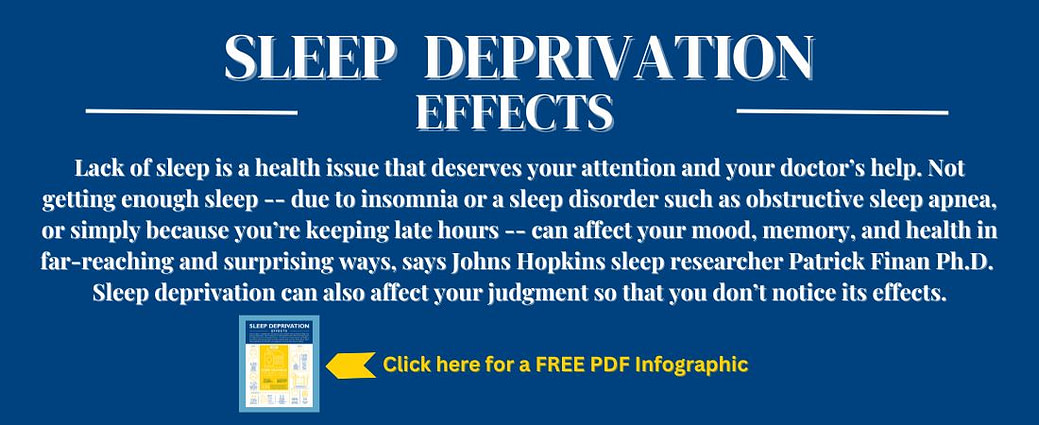Sleep is often overlooked as an essential aspect of our daily routine. However, not getting enough or proper sleep can have profound and long-lasting negative effects on our physical, emotional, and cognitive health. From fatigue and irritability to increased risk of chronic health conditions and impaired cognitive function, the consequences of sleep deprivation are significant. In this article, we will explore the negative effects of not getting enough sleep and provide practical steps to improve your sleep quality and overall well-being.
Do you ever feel like a zombie, stumbling through your day in a fog of exhaustion? Are you constantly relying on caffeine to keep you going? If so, you're not alone. In today's fast-paced world, sleep is often viewed as a luxury we can't afford. However, the truth is that sleep is not a luxury; it's a necessity. Not getting enough or proper sleep can have profound negative effects on our physical, emotional, and cognitive health. In this article, we will explore the sleep deprivation epidemic and provide practical steps to help you get the restful, rejuvenating sleep your body and mind need.
We must make this a priority. Sleep is an essential part of our daily routine that is often overlooked, as we prioritize other activities and responsibilities in our overly busy lives today.
When we do not get enough or proper sleep, the negative effects on our bodies and minds can be profound and long-lasting.
Without question, one of the most noticeable effects of not getting enough sleep is fatigue. When we are tired, we lack energy and motivation, making it harder to focus and perform tasks effectively. Fatigue can also lead to irritability, mood swings, and even depression, affecting our emotional well-being.

In addition to fatigue, lack of sleep can also affect our physical health. Chronic sleep deprivation has been linked to an increased risk of heart disease, high blood pressure, obesity, and diabetes. It can also weaken our immune system, making us more vulnerable to illnesses and infections.
As mentioned previously, another negative effect of not getting enough sleep is impaired cognitive function. Let's not just gloss over this. Think about it, when you're struggling to understand something, or have it make any sense to you, you tend to think that perhaps you're not as smart as you initially thought. Not in a haughty or an arrogant way, it's just off-putting because you think to yourself, "I should be able to get this." Especially if you're with others that are easily doing it, or seem to be able to function in a normal manner, and there you are having such a difficult time. Also, sleep plays a crucial role in memory consolidation and learning. When we do not get enough sleep, our ability to retain new information, concentrate, and think critically can suffer. This can affect our performance at work or school and can have long-term implications for our career and personal growth.
Sleep deprivation can also affect our judgment and decision-making abilities, making it harder to make rational choices and increasing the risk of accidents and injuries. In fact, studies have shown that fatigue-related accidents are responsible for a significant number of car crashes and workplace incidents.
The negative effects of not getting enough or proper sleep are not limited to adults; children and teenagers are also at risk. Sleep is particularly crucial during the developmental years, as it plays a vital role in physical and cognitive growth. Lack of sleep in children and teenagers can lead to poor academic performance, behavioral problems, and an increased risk of mental health issues such as anxiety and depression.

According to a study, nearly one-third of adults in the United States report not getting enough sleep regularly. Improper sleep has numerous negative effects on our health, including physical and emotional ailments. In this article, we will discuss the negative effects of improper sleep, including some examples of physical and emotional ailments caused by bad sleep.
The Physical Effects of Improper Sleep:
Obesity and Weight Gain
Several studies have found a link between improper sleep and weight gain, obesity, and metabolic disorders. One study found that people who slept less than six hours a night had a higher body mass index (BMI) than those who slept for longer hours. Another study found that short sleep duration is associated with increased risk of obesity, especially in children and adolescents. The lack of sleep can affect hormones that regulate appetite, leading to increased hunger and cravings for high-calorie foods.
Cardiovascular Disease
Improper sleep is also linked to cardiovascular diseases, such as hypertension, coronary artery disease, and stroke. One study found that people who slept less than six hours a night had a higher risk of developing hypertension than those who slept for longer hours. Another study found that sleep deprivation can affect blood pressure and heart rate, leading to an increased risk of cardiovascular disease.
Diabetes
Improper sleep is also associated with an increased risk of type 2 diabetes. One study found that people who slept less than six hours a night had a higher risk of developing diabetes than those who slept for longer hours. Sleep deprivation can affect insulin resistance and glucose metabolism, leading to an increased risk of diabetes.
Weak Immune System
Sleep is essential for the proper functioning of the immune system. Improper sleep can weaken the immune system, making us more susceptible to infections, such as the common cold, flu, and other respiratory infections. One study found that people who slept less than seven hours a night were three times more likely to develop a cold than those who slept for eight hours or more.
There are several other ailments that are a result of improper sleep. This is not an exhaustive list, of course. If this is an important topic for you, I would suggest you do a good deal of research and learn all you can about this. Improper sleep is so, so harmful and the good news is that there are some simple fixes that anyone can do. Take my word for it, it's well worth your time.

The Emotional Effects of Improper Sleep:
Depression
Several studies have found a link between improper sleep and depression. People who suffer from insomnia are more likely to develop depression than those who get enough sleep. Lack of sleep can affect mood, leading to irritability, mood swings, and other emotional disturbances.
Anxiety
Improper sleep can also lead to anxiety and stress. One study found that people who slept less than six hours a night had a higher risk of developing anxiety disorders than those who slept for longer hours. Sleep deprivation can affect the production of hormones that regulate stress, leading to increased anxiety and stress levels.
Memory and Concentration
Sleep is crucial for memory consolidation and concentration. Improper sleep can affect memory and cognitive function, leading to forgetfulness, difficulty concentrating, and poor performance at work or school. One study found that people who slept less than six hours a night had a lower cognitive performance than those who slept for longer hours
Irritability and Mood Swings
Improper sleep is so detrimental. Sleep deprivation can affect mood-regulating hormones, leading to increased irritability and mood swings, and other emotional disturbances.
There's a greater tendency to be easily frustrated and angered.
You'll experience a decreased ability to cope with daily challenges.
Fortunately, there are practical steps we can take to improve the negative effects of sleep deprivation. Here are some useful tips:
1. Establish a consistent sleep schedule: Try to go to bed and wake up at the same time every day, even on weekends. This helps regulate your body's internal clock and promotes better sleep quality.
2. Create a relaxing bedtime routine: Develop a routine that helps you wind down and relax before bed. This can include taking a warm bath, reading a book, or listening to calming music.
3. Make your sleep environment comfortable: Ensure that your bedroom is cool, quiet, and dark. Invest in a comfortable mattress and pillows, and use blackout curtains or a white noise machine if necessary.
4. Avoid caffeine, alcohol, and nicotine: These substances can interfere with your sleep quality and make it harder to fall asleep or stay asleep.
5. Limit screen time before bed: The blue light emitted by electronic devices can disrupt your body's natural sleep-wake cycle, making it harder to fall asleep. Try to avoid using electronic devices for at least an hour before bed.
6. Exercise regularly: Regular exercise can improve sleep quality and duration, but avoid vigorous activity close to bedtime.
7. Try relaxation techniques, such as yoga, meditation, or deep breathing exercises.
8. Limit daytime naps to 30 minutes or less.
9. Avoid large meals and beverages before bedtime.
10. Manage stress: Stress and anxiety can interfere with your sleep quality. Find healthy ways to manage stress, such as practicing relaxation techniques like meditation or deep breathing exercises.
11. Consider seeking professional help, such as cognitive-behavioral therapy, if you have chronic insomnia or other sleep disorders.
If you have persistent sleep problems or symptoms of a sleep disorder such as sleep apnea, talk to your doctor. They can recommend appropriate treatment, such as medication or a CPAP machine.

References:
1. Centers for Disease Control and Prevention (CDC). (2021). Insufficient sleep is a public health epidemic. Retrieved from https://www.cdc.gov/sleep/about_sleep/chronic_disease.html
2. National Heart, Lung, and Blood Institute (NHLBI). (2021). Sleep deprivation and deficiency. Retrieved from https://www.nhlbi.nih.gov/health-topics/sleep-deprivation-and-deficiency
3. Institute of Medicine (US) Committee on Sleep Medicine and Research. (2006). Sleep Disorders and Sleep Deprivation: An Unmet Public Health Problem. National Academies Press (US). Retrieved from https://www.ncbi.nlm.nih.gov/books/NBK19958/
4. Harvard Health Publishing. (2022). Sleep deprivation may hamper weight control. Retrieved from https://www.health.harvard.edu/blog/snooze-more-eat-less-sleep-deprivation-may-hamper-weight-control-202204042718
5. National Library of Medicine. (2021). Consequences of chronic sleep loss. Retrieved from https://www.ncbi.nlm.nih.gov/books/NBK19961/
6. Cedars Sinai. (2021). Sleep deprivation. Retrieved from https://www.cedars-sinai.org/health-library/diseases-and-conditions/s/sleep-deprivation.html
1. Cleveland Clinic. (2022). Sleep Deprivation. Retrieved from: https://my.clevelandclinic.org/health/diseases/23970-sleep-deprivation
8. Healthline. (2023). The effects of sleep deprivation on your body. Retrieved from https://www.healthline.com/health/sleep-deprivation/effects-on-body
In conclusion, sleep deprivation is a widespread and serious problem that affects many people around the world. The negative effects of sleep deprivation are numerous and can have a significant impact on our physical and mental health.
One of the biggest challenges facing individuals today is the increased use of technology, which often interferes with our ability to get adequate sleep. Late-night use of electronic devices, such as smartphones, tablets, and laptops, can disrupt our sleep patterns and make it more difficult to fall asleep. Additionally, the constant stimulation of technology can interfere with our ability to relax and unwind, leading to increased levels of stress and anxiety.
It's important to prioritize sleep and make it a regular part of our daily routine. While it may seem tempting to sacrifice sleep for work or social obligations, getting adequate rest is essential for our overall health and well-being.
In the end, it's essential to acknowledge that the sleep deprivation epidemic is a complex issue that requires collective action to address. Governments, workplaces, and individuals all have a role to play in promoting healthy sleep habits and reducing the negative effects of sleep deprivation. Companies should prioritize their employees' well-being by providing flexible work schedules, promoting a healthy work-life balance, and encouraging employees to take breaks and rest. Additionally, governments should also recognize the importance of sleep and promote healthy sleep habits through education and public health campaigns.
Overall, sleep deprivation is a widespread and serious problem that requires our attention and action. It's time to recognize the importance of sleep and prioritize it in our daily lives. By doing so, we can improve our overall health and well-being, reduce the negative effects of sleep deprivation, and lead happier, more fulfilling lives.



